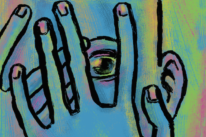
“Two possibilities exist: either we are alone in the Universe or we are not. Both are equally terrifying.” ~Arthur C. Clarke
“You are not alone” is a phrase we speak, hear, and read over and over again.
Testimony and statistics prove that others have lived our types of misfortune. Given that evidence, why is it that so many of us feel as if we are somehow different than all the others who have triumphed over tragedy or are climbing those proverbial mountains?
The seed was first planted ages ago when I was having a conversation with a loved one during a difficult time in her life. “I know how you feel,” I said, “I’ve been there.” How many times have you given or received this type of comfort?
“You’ve never been where I am!” she shouted back at me. “My life’s a living hell.”
Right then I had an AHA moment. “You’re right,” I said. “I’ve never been in the exact same place you’re in, but I’ve been right next door. Everyone’s hell is different, but everyone has their own.”
In that moment I realized that, though others have experienced similar hardships and emotions, we can’t fully understand because we are nothing more than bystanders, albeit neighbors who can somehow relate.
Years after that epiphany, something continued to plague me. Why, when we understand that we aren’t alone, do so many of us still feel alone?
We are often faced with short-term situational aloneness. A job, school, or home relocation takes us away from friends, family, and associates, often causing a short-term sense of separation. Divorce often creates a shift in our relationships with others as we try to navigate a new social normal.
Aside from these obvious forms of separation are more subtle, complex, and longer lasting causes.
Here are five reasons we feel alone and what we need to know about them.
1. We feel alone because we are alone in our heads and in our hearts.
It might seem pretty basic, but for those of us who were introduced to “You are not alone” at a young age, or those like me who gravitate toward more straightforward interpretations, we might still internalize the quote more literally. The truth of the matter is that no one other than us can occupy our thoughts or the feelings that are our heartbreak.
The key to overcoming this type of isolation lies in two things: 1) changing how we identify with the quote and 2) understanding that we are not alone in being alone in those areas. Though we can relate to one another’s situations and suffering, the details, breadth, and depth of every person’s experience is equally similar, yet as unique as our fingerprint.
2. We compare ourselves to others.
At some time, every single one of us has compared ourselves to another in a way that shut us down. We say things like “I wish I had her body/ brains/charm/courage/way with words/people.” Comparison comes from one of two places: an inner drive to improve ourselves or some unspoken/unidentified need to discount our abilities.
When we balance ourselves against others in a way that says we don’t measure up, we invite such feelings as jealousy, resentment, and anger. It’s hard to cover up these types of emotions when we’re trying to connect with those we envy.
This is an area I struggle to regularly reign in. I am surrounded by people I respect and wish only the best. Sometimes, however, I find myself thinking things like, Maybe if I’d finished my college degree—she graduated while raising a family/working two jobs/insert your whatever—I’d be further along in achieving my goals.
In other words: I’m not good/ fast/smart/motivated enough/insert your whatever.
Whether we’re avoiding intimate interaction due to intimidation or we’re pushing others away because of our misguided feelings, we place ourselves outside the circle in which we’d like to be.
In an attempt to regain our position, we often resort to other problematic behaviors like hiding our vulnerabilities. Covering up who we are further feeds our feelings of isolation because, fundamentally, we are social beings who need to relate to others.
When we use contrast in a healthy manner (recognizing admirable qualities we want to emulate), we can be motivated and inspired to make life changes. Identifying the underlying emotion (jealousy versus admiration) empowers us to change our thinking and position ourselves back inside that social circle.
3. We are our own worst critics.
We all have that inner critic who lets us know when we’re on the wrong path, when we’ve messed up, or aren’t measuring up to the standards we set for ourselves, or those adopted from other’s expectations.
Common self-deprecating talk often contradicts truth and what we’re hearing from the outside world.
I’ll never get this right. I’m such a screw up. What is wrong with me?
This inner critic also masks itself as a protective partner, one that encourages us to feel good about giving up, which adds to our confusion about where and how we fit in. Ah, it’s not that important, anyway is an expression that lulls us into a false sense of security and persuades us to abandon people and purpose. This type of maladaptive comfort is a breeding ground for the comparisons mentioned above, further isolating us from others.
In her article, Are You Sabotaging Your Relationship?, Lisa Firestone, Ph.D. encourages us to confront the dominating critical inner voice “as a third-party threat.” She writes, “Make sure to identify it and separate it from your real point of view.”
Firestone goes on to say that acknowledging our power and challenging our defense mechanisms allows us to work on the only thing we have any real control over: ourselves.
A therapist once asked me if I would hold another person to the same standards and treatment I was employing on myself. Being mindful of how we view ourselves and making room for constructive criticism incites productive change. This sort of kind evaluation allows us to realize that we are, like everyone else, human.
4. We are filled with emotions such as guilt, shame, or self-loathing.
These types of feelings attack our very character, our thoughts, and our worthiness. Unresolved remorse over something we said, did, or didn’t do can manifest itself into a perpetual state of shame or low self-esteem, which can morph into hatred for oneself if left untreated.
When we think badly about ourselves, we often assume others are viewing us the same way. The fear of being judged poorly by others often causes us to conceal our true self.
We might hide our flaws, cover up our mistakes, and sometimes go so far as to blame others as a way of avoiding ownership. This creates a vicious cycle that creates more internal conflict, pushes people away, and further separates us from social circles.
In her article Shame: A Concealed, Contagious, and Dangerous Emotion, Mary C. Lamia Ph.D. wrote, “Hiding often accompanies behaviors that are themselves a trigger for further shame, such as addictions, compulsive behaviors, harsh self-criticism, or self-denigration.”
Lamia goes on to suggest that recovering from shame requires a different perspective, one where we accept responsibility for our actions and are willing to recognize certain triggers.
There was a time in my life where I shoplifted bizarre items like tuna fish. Despite overwhelming shame and fear, I never understood what compelled me, until I finally opened up to my long-term counselor. After numerous questions, he informed me that sometimes people do destructive things to reinforce their beliefs about themselves.
An active community member on all fronts, people regularly exclaimed how valuable, loving, helpful, and intelligent I was, a direct contradiction to my beliefs that I was unworthy, unlovable, lacking, and not smart enough. That’s why I stole: to prove to myself that I was flawed. When I recognized this disparity and understood my subconscious motivations, the desire disappeared.
When we stop hiding, take responsibility for our actions, and start to recognize those things that illicit our destructive thoughts and behaviors, we can begin to break down the conflicts that create our lack of confidence. Self-belief allows us room to trust in others, which in turn, makes us feel less alone, and makes us more welcoming and welcomed.
5. We are distracted.
This, too, might seem basic, but distracted behavior is often a major cause of separation.
Think about all those times you’ve tried to have a conversation with your partner, your children, or a friend who is constantly checking a cell phone for social media updates. The message we often read into such behavior is that our time isn’t respected, or that the phone call, text, or update is more important than we are.
How many times have you been involved in a conversation where someone hears only part of what you say or constantly asks you to repeat yourself? We begin to feel like the other person doesn’t really care. If this type of exchange is habitual, we might find ourselves not wanting to hang out with that individual simply because we want meaningful relationships.
Many factors could cause us to act this way: We could be avoiding something; we could be bored; or we could have some physiological or psychological condition that makes it difficult for us to focus. Either way, when we are disengaged, people often don’t feel wanted, needed, or important, and they will eventually quit calling and coming around.
Paying attention to how we are interacting with others and watching for signs that indicate we aren’t engaged will help keep us plugged in to our own availability and help us initiate and maintain active, healthy relationships with others and with ourselves.
Being aware of our actions, emotions, and thoughts helps us stay connected to others.
It is the sum of our human experience that can create our loneliness, and it is the sum of our shared human experiences that can unite us with other members of the human race. In the end, as long as there are others to interact with, we are not alone. We simply have to realize this and choose to connect.
About Annah Elizabeth
Annah Elizabeth is the creator of The Five Facets Philosophy on Healing™, a groundbreaking guide that helps us triumph over tragedy and adversity. Annah believes we all have the power to heal our heartaches big and small. Find your own healing paths, inspirational posts, videos, and books in Annah’s global neighborhoods: The Five Facets website, Twitter, Facebook, and Instagram.













 Though I run this site, it is not mine. It's ours. It's not about me. It's about us. Your stories and your wisdom are just as meaningful as mine.
Though I run this site, it is not mine. It's ours. It's not about me. It's about us. Your stories and your wisdom are just as meaningful as mine.
wow amazing… i was feeling so lonely this weekend and started crying from it. I don’t have a lot of friends and this is my choice. So i am used to being alone, until i met this guy from my class.. we started studying together for finals,…. and all of a sudden i felt so lonely because of all the reasons that were mentioned here, except for the last one. He is such a nice person and very inviting and i started thinking to myself i’ve always wanted to be that person, to make an impact on someone. I guess i was more emotional becuase I normally don’t have alot of people talk to me in the first place.. so having this connection with someone else made me feel lonely because I can’t seem to easily be friendly as he was. I am a very nice person in my opinion.. but can’t seem to go out of my way to make someone feel the way he made me feel. I do believe certain people do come into your life because they are meant to be there or because they are there to teach you something. So far, talking to him has made me aware that I don’t accept myself and I judge people too much, thinking they are not nice. But really there are nice people out there just like him!! I hope we can stay friends… but of course don’t want to force anything. Thank you so much for this post… I now know that my feelings are valid!!! 😀 THANK YOU THANK YOU!!!
Hi, Ashley
I am happy this post had meaning for you! Awareness is half the battle or more and it sounds like you have entered a new awareness about yourself and how you connect with others. Hopefully you’ll be able to apply your previous insights with some of the ones you picked up here and grown in your comfort in connecting with others.
Thank you for reading and for sharing your thoughts. I am truly honored to be a part of your journey!
Healthy self-criticism is good sometimes to improve and grow as a person, but it becomes quite debilitating when it gets out of hand. It would to me by default until I learnt to silence my inner critic and just stopped being so hard on myself.
Hi, Mousumi!
Thank you for reading and taking the time to comment! Yes, healthy or constructive self-criticism does help us grow and improve! That approach is kind and reflective and fosters new ideas, whereas the self-deprecating chatter in our heads leaves us feeling defeated…
I am happy to read that you found a way to silence that destructive inner critic and foster the positive and reflective self evaluation side of you! Keep spreading your message for it will help others by showing them how effective nurturing is. 🙂
Seems true but not always . I have been facing this situation at constant intervals . I have been learning to accept the fact that self criticism is necessary but not always in such harsefull manner.
This spoke to me
I’m glad this post resonated with you, Shakur. Thank you for reading and for leaving a message. I appreciate your time and courage to understand yourself a little bit better. 🙂
Thank you for helping. I’ve searched the net for hours looking for a remedy for love and to spot certain negative aspects that reflect on my life. Thank you!!!